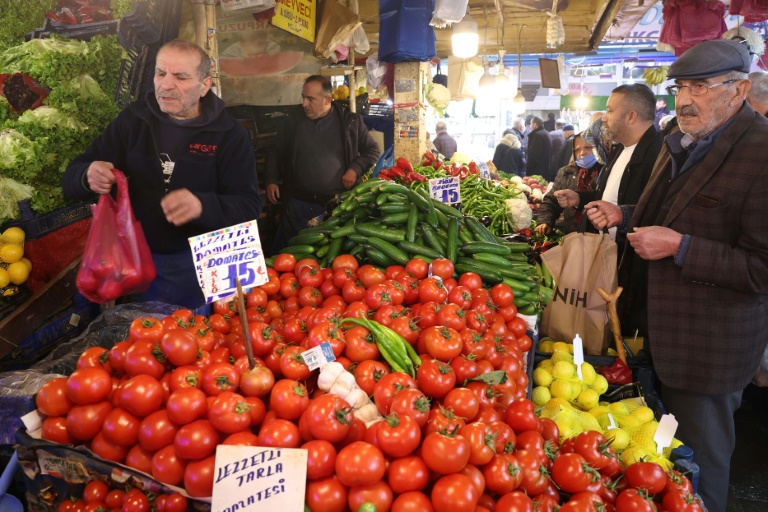Turkish inflation exceeds 75% but peak in sight

President Recep Tayyip Erdogan dropped his opposition to interest-rate hikes to combat soaring consumer prices
Istanbul – Turkish inflation jumped above 75 percent in May, official data showed Monday, but officials expect consumer prices to have finally peaked in a cost-of-living crisis that has dogged President Recep Tayyip Erdogan.
Turkey has been battling soaring consumer prices that prompted Erdogan to drop his opposition to interest-rate hikes to combat inflation.
The central bank began to raise its key rate in June 2023, gradually taking it from 8.5 percent to 50 percent.
Last month, central bank governor Fatih Karahan raised the year-end inflation forecast to 38 percent, up from a previous estimate of 36 percent.
But Karahan also said inflation would begin to slow in June after reaching a peak in May.
“The hardest part is over,” Finance Minister Mehmet Simsek wrote Monday on X.
“The permanent drop in inflation will begin in June,” he added. “The transition period in the fight against inflation has been completed and we are entering the process of disinflation.”
Inflation will “very likely” fall under 50 percent by the end of the third quarter, Simsek predicted.
The staggering rise of consumer prices and the collapse of the Turkish lira are deemed responsible for the severe electoral setback inflicted on Erdogan’s AKP party in March municipal elections.
– ‘Bumpy disinflation’ –
Turkey’s national statistics office said Monday that annual inflation reached 75.45 percent in May after accelerating to 69.8 percent in April.
It added that consumer prices had risen by 3.7 percent on a monthly basis between April and May, in line with central bank forecasts.
A group of independent economists, ENAG, said consumer prices actually increased by 120.7 percent in May year-on-year and by 5.7 percent on a monthly basis.
Liam Peach, senior emerging markets economist at London-based research group Capital Economics, said the May rise was stronger than expected and “slightly disappointing”.
“It had looked like price pressures were easing in recent months, but the 3.4 percent month-on-month increase in May was higher than in both March and April,” Peach said in a note, predicting that “bumpy disinflation lies ahead”.
“We’re confident that inflation has now reached a peak but, with today’s release containing a few unpleasant surprises, the pace of disinflation in the second half of the year is looking a bit more uncertain,” Peach said.
– Austerity plan –
Erdogan long blamed inflation on high interest rates, even though it is the conventional policy at central banks worldwide to raise borrowing costs in order to lower inflation.
But after winning re-election last year, he returned to economic orthodoxy and expressed full confidence in the economic team led by Simsek.
Last month, Simsek announced a three-year austerity plan aimed at reducing public spending to calm inflation.
One economist, Iris Cibre, said consumer prices would have to rise by 1.17 percent per month until the end of the year for inflation to reach the central bank’s 38 percent target.
“Meanwhile, salaries will fall by 26 percent,” she said.
